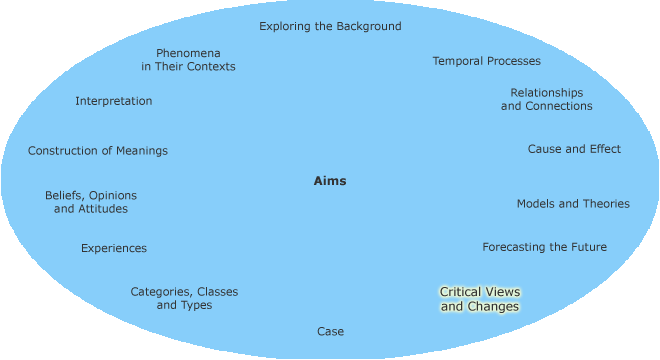Critical Views and Changes
Humanistic research often critically approaches cultural or social phenomena. A critique (critical view) may focus on actions, practices, theories, ways of thinking, evaluations, interpretations and use of language. The main aim of this type of research may be to form a reasoned critique on the topic chosen as the focus of the research. The starting point of research is often to identify the present condition of the phenomenon and to indicate the problems and structures, which have influenced the formation of the present condition of the phenomenon.
Humanistic research may also aim to influence the research phenomenon or participate in changing it. The key characteristic of this kind of research aim is that you believe the present condition of the research phenomenon to be insufficient, false or unsatisfactory. Consequently, you will try to find possibilities for new conditions or change. The research consists of planning the action and the practices which will cause the change, participating in the action or event and evaluating the results of the action.
Strategies
Critical research may focus on concrete phenomena, theoretical concepts, models or ideologies. You can base critical research on either empirical research (the norm as critical research done with the aim of making changes is often based on perceptions of concrete phenomena and observations of concrete materials) or theoretical research.
Critical research may also be seen as a research strategy; although critical points of view are included in various other research strategies. In order to form a criticism (the underlying aspect of critical research), you can use other research strategies: Qualitative research enables you to formulate the criticism, the action of change and the evaluation of the action on a phenomenon. A case study enables you to formulate a criticism or change of a small group of research objects. Action research enables you to explore the influence, change and evaluation of the influence on the phenomenon. Multi-method research enables you to explore both the change as well as research into the change.
Data Collection
When your research aim is to make a criticism and change current thought on a theory, model or point of view, you can use different types of data collected by a variety of methods. The characteristics and environment of the researched phenomenon and the target of the criticism, influence or change determine the selection of the data collection methods.
Action research: the data typically consist of self-produced (you or your group) material. The data may consist of existing concrete materials or can be produced during the research process. You can, by using various types of data get a multiple viewpoint of the phenomenon, the means of influencing it and evaluations of the influence. The data has a particular role: the influence may occur as an interaction and dialogue with the data. You can collect data through various methods, such as: interviews and observations.
Critical research: there is not a particular established data collection method. The method you will use depends on the focus of the criticism. The most frequently used are analyzing existing texts and images. However, you can self-produce the materials during the research process. You can also collect data from archival sources like interviews, stories or other recorded materials.
You can use a variety of research strategies: Population research is suitable when the quantity of available data on a phenomenon is small. Sampling is suitable when the quantity of available data on a phenomenon is too large for you to analyse all of it. Random sampling enables you to select a small element without bias. Purposive sampling (goal-directed sampling) enables you to select samples that match the aim of the study.
Data Analysis
Qualitative analysis methods are suitable for critical research and action research.
Qualitative analysis methods suitable for critical research and action research are: narrative analysis, conversation analysis, discourse analysis, phenomenographical analysis and close reading. In addition, qualitative analysis methods suitable for action research are: thematic analysis and typification analysis.
Philosophy of Science
Qualitative analysis methods in the humanities are based on interpretivism. Views emphasising interpretation in the formation of meanings and subjectivity in meaning-making processes, obey the idea of relativism.
Analysis methods in critical research and action research must provide different viewpoints. The philosophical background of the research can also be broad. The research may focus on particular aspects:
Constructivism, as a way of perceiving knowledge and reality as meaning structures.
Hermeneutics, as a way of making interpretations.
Phenomenology, as a way of understanding experiences of phenomena.
Psychoanalytic theory, Post-structuralism, and Deconstructivism have formed a philosophical base for certain critical approaches, such as feminist research.
Social constructivism enables focusing on the social and linguistic practices and structures.
Pragmatism is the basis of action research, which aims to study practice and change.
Instrumentalism views the feasibility of scientific theories, models, interpretations and ideas and is the basis of profoundly practice-orientated action research.

